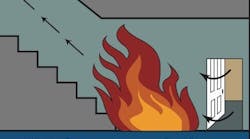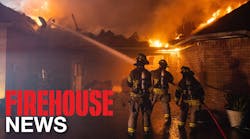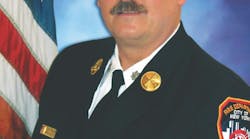The 9/11 Commission went out of business last month with a final blast that sharply criticized Congress, the Bush administration, the Department of Homeland Security and the federal bureaucracy for failing to implement most of the Commission's major recommendations. In a scathing report that echoes many of the frustrations expressed by the fire-rescue service, the bipartisan Commission cited a "lack of urgency" in applying the lessons that should have been learned in the four years since the 2001 terrorist attacks.
"We believe that the terrorists will strike again," Chairman Thomas H. Kean, a former Republican governor of New Jersey, told a press conference. "If they do, and these reforms that might have prevented such an attack have not been implemented, what will our excuses be?" The commission gave failing or low grades to the government's effort - or lack of effort - to implement half of the panel's 41 recommendations. Included on the failure list are the needs to enlarge the radio spectrum for public safety and to allocate federal homeland security funds on the basis of risk assessment instead of giving every state a per capita share. (As this is written, Congress is still playing around with legislation aimed at correcting both problems.)
Despite initial opposition from the White House, the 10-member Commission was created to investigate all aspects of the 9/11 attacks - including emergency response by fire departments, police and other agencies. The distinguished panel was divided evenly between Democrats and Republicans and included former governors, congressmen and cabinet officers. They concluded their hearings by the summer of 2004 and released a 450-page report that immediately became a best-selling book. It was a superb job that pulled no punches in detailing what went wrong inside America's intelligence and law enforcement agencies. The report devoted only one chapter to first responders and focused mainly on the communications and command problems firefighters encountered at the World Trade Center and, to a lesser degree, at the Pentagon. It called for the establishment of unified incident command systems and "interoperable" radio networks that would enable fire, police and adjoining jurisdictions to talk to each other - issues the fire service has been advocating for many years.
Coincidentally, only a few days before the 9/11 Commission's eruption, Louisiana Gov. Kathleen Babineaux Blanco released 100,000 pages of documents that detail her dealings with the White House, FEMA and other federal agencies as Hurricane Katrina approached and destroyed the Gulf Coast. To no one's surprise, the papers reveal confusion and chaos in a state and region that was unprepared to face any kind of catastrophic disaster. Worse yet was the petty bickering, posturing and political game-playing that went on between local, state and federal officials - some of whom turned out to be incompetent windbags.
One thing that comes through loud and clear in the Blanco papers is how long it takes and how difficult it can be to mobilize National Guard and federal troops and get them to the scene of a disaster. It reaffirms what we've always known: the only agency that can respond fast enough to save lives is the local fire department. Based on what we saw in the hurricanes, I'd also add the U.S. Coast Guard to the short list of genuine first responders. (They're fast and they're good!) Therefore, it seems logical that most of the money and resources to train and equip first responders should go to local fire departments and the Coast Guard.
According to a Washington Post story, Louisiana got $19 million in federal grants to upgrade its emergency communications system, but most of it went to the state police. That, of course, is a familiar story we've heard from other states. In an interview with the Post, Chairman Kean said: "On September 11, people died because police officers couldn't talk to firemen. And, Katrina was a reenactment of the same problem. It is really hard to believe this has not been fixed."
Unfortunately, the last blast from the 9/11 Commission didn't seem to have much impact on the people who should have been embarrassed. A White House spokesman insisted that the administration is implementing the recommendations. On Capitol Hill it was business as usual, with the House and Senate squabbling over a budget that is loaded with pork barrel projects. Lee Hamilton, the Commission's vice chairman, is a highly respected Democrat from Indiana who retired after serving 34 years in the House. He describes Congress as being "dysfunctional."
Sadly, this probably isn't the last we've heard from the 9/11 Report. You can be sure that when the next disaster strikes - whether it's an act of terrorism or an act of nature - the Commission's unheeded warnings will be repeated, again and again.
Hal Bruno, a Firehouse contributing editor, retired as political director for ABC News in Washington and served almost 40 years as a volunteer firefighter. He is a director of the Chevy Chase, MD, Fire Department and chairman of the National Fallen Firefighters Foundation.





